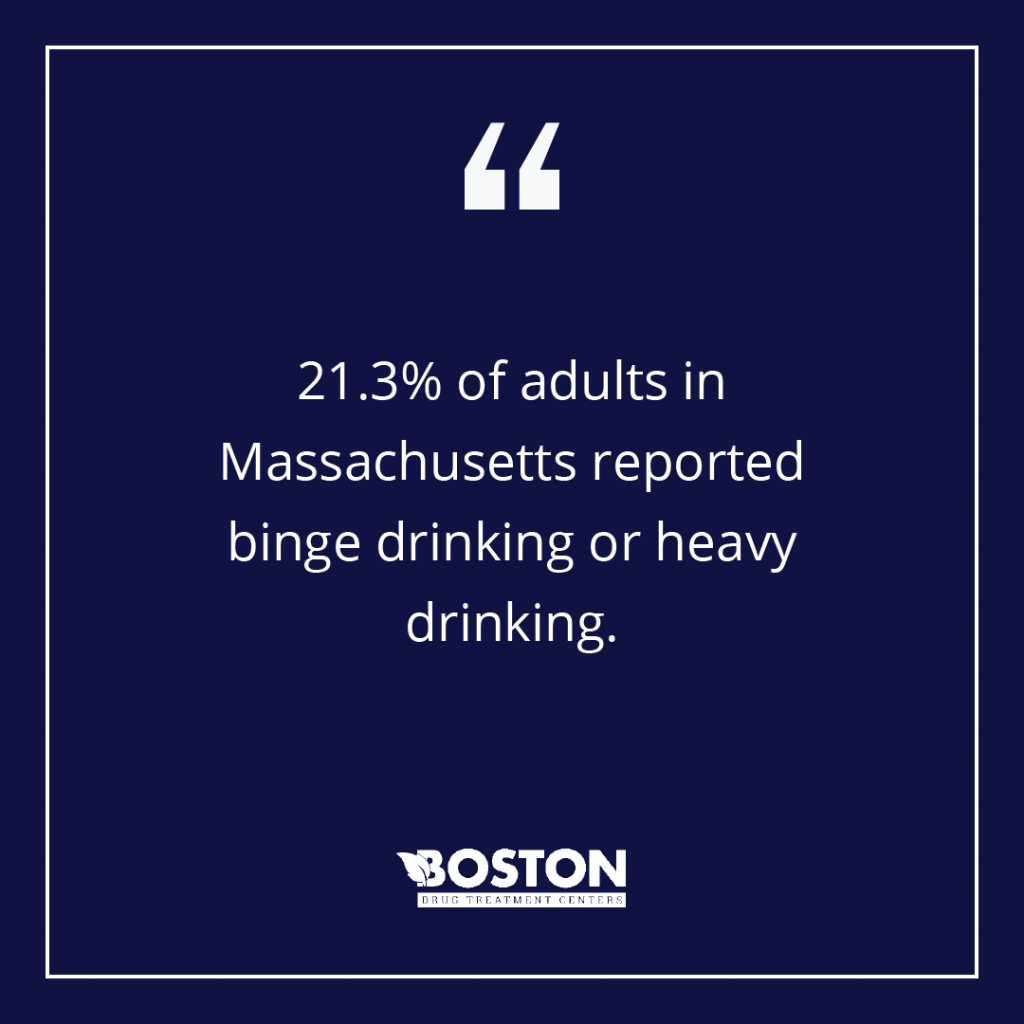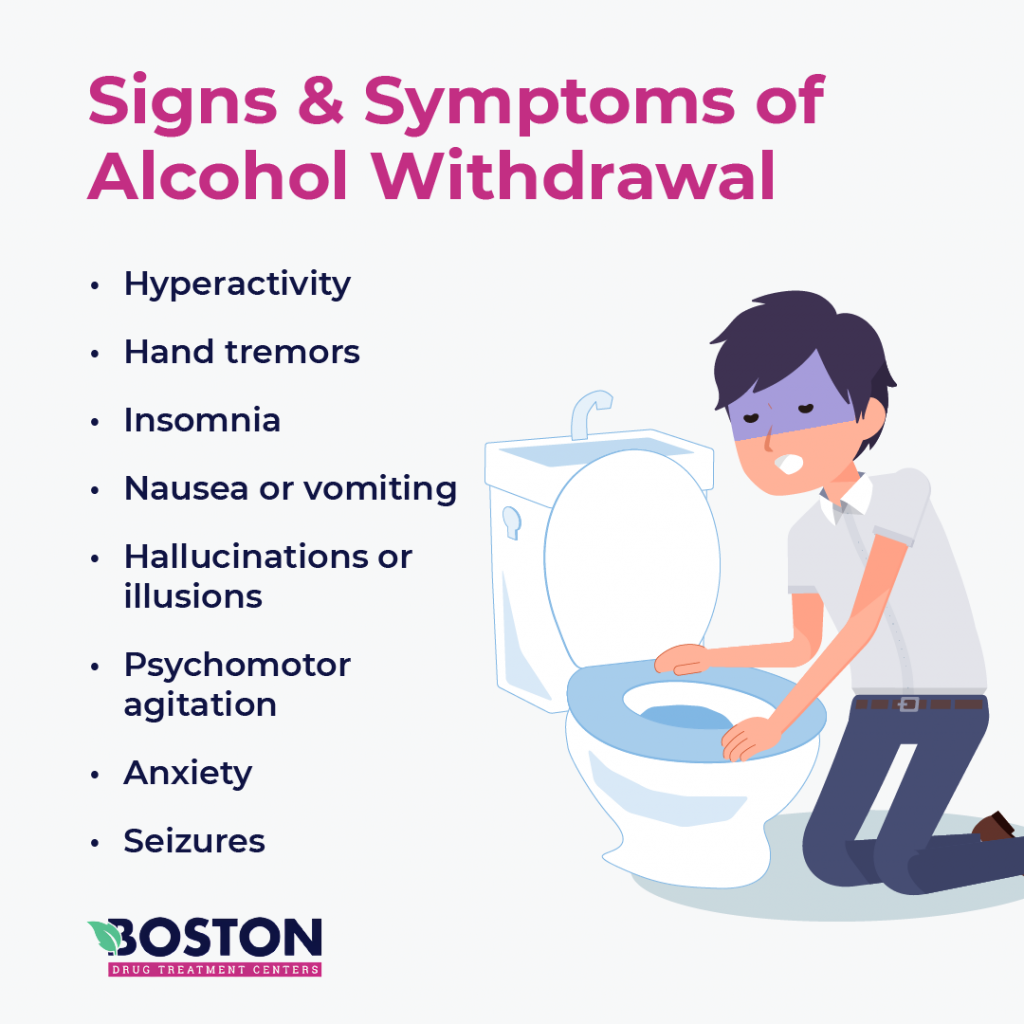Alcoholism Treatmentin Boston, MA
Massachusetts residents experience higher than the U.S. average rates of excessive drinking across all age groups.1 In 2019, 21.3% of adults in Massachusetts reported binge drinking (defined as four or more drinks for women and five or more drinks for men) or heavy drinking (defined as eight or more drinks for women or 15 or more drinks for men) within the last 30 days.1 Experts believe this number increased further during the COVID-19 pandemic.2
In 2015, a report released by the State Admissions to Substance Abuse Treatment Services (TEDS) found that Massachusetts reported more than 20,000 admissions into alcohol treatment programs—the highest admission rate among all 50 states.3
If you’re ready to begin exploring alcohol addiction treatment options in the Boston area, our team of specialists at Boston Drug Treatment Centers can guide you through program options no matter where you are in your recovery journey. Alcohol addiction recovery is possible regardless of the severity of your alcohol use, and it’s never too late to seek help.4 Give us a call at 857-577-8193.

Signs You Might Need Alcohol Addiction Treatment
Alcohol affects virtually every aspect of brain neurotransmission, and researchers believe that these chemical reactions in the brain are responsible for the transition from controlled alcohol use to compulsive alcohol misuse.5
The complex nature of alcohol addiction makes abstinence challenging for people who drink alcohol frequently. Symptoms of alcohol addiction include both behavioral and physical attributes, so it’s important to be able to recognize the signs and symptoms.
These are some signs and symptoms that may indicate you could benefit from alcohol addiction treatment:6

- Drinking larger amounts of alcohol than intended
- Drinking alcohol over a longer period of time than you originally intended
- Having a persistent desire to cut down or control your alcohol use
- Unsuccessful attempts to cut down on or control alcohol use in the past
- Spending a great deal of time obtaining, using, or recovering from alcohol
- Craving alcohol
- Using alcohol interferes with work, school, or personal obligations
- Continuing to use alcohol despite knowing that it causes problems in your life
- Giving up or ignoring important relationships, hobbies, or work-related activities because of alcohol use
- Using alcohol in physically hazardous situations
- Noticing that you need higher amounts of alcohol to achieve the same level of intoxication or desired effects
- Experiencing symptoms of withdrawal when you don’t drink
- Friends and family expressing concerns about your drinking
- Feeing annoyed when people criticize your drinking
- Feeling guilty about your drinking
- Thinking that you should cut down on drinking but being unable to
- Needing a morning drink to steady your nerves or cure a hangover
If you have experienced any of these signs or symptoms over the past 12 months, it may be a signal that you may need help to quit drinking.
Alcohol Withdrawal Symptoms
Alcohol withdrawal symptoms can be mild or intense, depending on your prior level of alcohol use and other factors. Symptoms of alcohol withdrawal can occur within several hours to a few days after you stop using alcohol.
- Hyperactivity (e.g., sweating, increased heart rate)
- Hand tremors
- Insomnia
- Nausea
- Vomiting
- Hallucinations or illusions
- Psychomotor agitation
- Anxiety
- Seizures
- Jumping or shakiness
- Irritability or feeling agitated
- Depression
- Fatigue
- Mood swings
- Sweating, clammy skin
- Headache
- Poor appetite
- Dilated pupils
When symptoms of alcohol withdrawal are intense, relapses can occur because some people use alcohol as a form of self-medication to relieve the symptoms.
Medically supervised treatment programs ensure that your recovery process is safe and effective. Controlled detox programs can help minimize alcohol withdrawal symptoms and help guide you through the detox process and toward a successful recovery.
If you or someone you care about is addicted to alcohol, treatment is available. Call our helpline at 857-577-8193, and take a step toward recovery.
Treatment for Alcohol Addiction
Treatment for alcohol addiction is vital for preventing long-term health complications, and it is never too late to get help.
The primary goals of treatment include reducing withdrawal symptoms and establishing effective coping strategies to change habits and prevent relapses. Personalized alcohol addiction treatment programs enlist a variety of targeted therapies to help you end the cycle of alcohol misuse and live a sober lifestyle.
There are several alcohol addiction treatment settings available, depending on your unique needs and challenges. Your recovery specialist can help guide you through the program selection process to ensure you find one that is a good fit for you.
Treatment programs range from 24/7 residential care facilities to outpatient visits with addiction specialists.
The most common treatment settings include the following:8
- Inpatient: Inpatient treatment programs offer intensive, round-the-clock medical care and monitoring. These programs are most appropriate for patients who are at high risk for intense withdrawal symptoms or who have complex co-occurring medical conditions.
- Partial Hospitalization Program (PHP): PHPs are intermediate programs that are sometimes called day rehabs. This type of treatment program provides the same intensity as an inpatient treatment but there are no overnight stays.
- Intensive Outpatient Program (IOP): IOPs are appropriate for patients who do not require medically supervised detox programs, and who wish to continue working during treatment.
- Outpatient: Outpatient treatment programs vary in terms of duration, frequency, and approach, but are usually best suited for patients with mild addictions or those who are in the later stages of recovery.
Therapies and Medications for Alcoholism
Comprehensive alcohol treatment programs usually include both traditional behavioral therapies and prescription medications. Behavioral therapies can help people who misuse alcohol set practical goals, establish skills to reduce or eliminate drinking, build strong support systems, and manage triggers to prevent relapses.
- Cognitive-behavioral Therapy (CBT): This focuses on identifying feelings or situations that trigger drinking, as well as finding coping strategies to manage stress and avoid relapses. This type of therapy helps patients make connections between thoughts, behaviors, and patterns.
- Motivational Enhancement Therapy: This strengthens the motivation to change drinking habits. The approach helps patients identify pros and cons of treatment, create realistic plans to change drinking behaviors, and develop coping skills needed to sustain their behaviors changes.
- Marital and Family Counseling: This involves family members and focuses on strengthening family support.
- 12-Step Therapy: This therapy promotes abstinence from alcohol through education and group-based support.
- Brief Interventions: These provide personalized counseling and support in short, private, or group-based sessions. This type of therapy provides individualized feedback to help patients solve problems and reduce the risk of relapses.
- Naltrexone (Vivitrol): Naltrexone blocks opioid receptors in the brain and helps people reduce heavy drinking and prevent relapses
- Acamprosate (Campral): Acamprosate reduces withdrawal symptoms and makes it easier to maintain abstinence
- Disulfiram (Antabuse): Disulfiram blocks the breakdown of alcohol in the body to reduce withdrawal symptoms and should only be used by patients who are completely abstaining from alcohol use
Specialists involved in your treatment process typically include primary care providers, psychiatrists, psychologists, social workers, and alcohol counselors. These health care providers are highly trained to ensure you receive the best treatment possible. They are also trained to help you manage withdrawal symptoms and related medical conditions throughout your recovery process.
Your treatment program structure will depend on a number of factors, including your medical history, previous experiences with treatment programs, and personal preferences. For example, patients who are managing co-occurring conditions may benefit from a dual-diagnosis program, where multiple conditions are treated simultaneously.
A personalized approach to treatment will increase the likelihood of a successful recovery.
Find Treatment for Alcohol Addiction in Boston, MA
If you’re curious to learn more about treatment program for alcohol addiction in Boston, MA, our treatment and recovery specialists are here to guide you through the process of finding a customized program that’s right for you.
No single approach works for everyone. That is why Boston Drug Treatment Centers is committed to help you find the program that’s right for you. With proper treatment, you can recover your physical, mental, emotional, and spiritual health. Regardless of where you are right now, or where you’ve been in the past, we’re here to help you move forward.
Boston Drug Treatment Centers is a Massachusetts-based directory providing you with easy access to the best alcoholism treatment centers in the Greater Boston area and beyond. We have been helping people just like you transition to a sober lifestyle, and we’re here whenever you’re ready to get started.
Call our helpline at 857-577-8193 to find a treatment program in Massachusetts that works best for you.
Resources
- United Health Foundation. (Accessed 10/6/2021). America’s Health Rankings analysis of CDC, Behavioral Risk Factor Surveillance System.
- Massachusetts General Hospital. (3/17/2021). Alcohol Use During the Pandemic.
- Department of Health and Human Services. National Admissions to Substance Abuse Treatment Services. Treatment Episode Data Set (TEDS) 2005 – 2015.
- National Institute on Alcohol Abuse and Alcoholism. (Accessed 10/6/2021). Alcohol Facts and Statistics.
- Vengeliene, V., Bilbao, A., Molander, A., & Spanagel, R. (2008). Neuropharmacology of alcohol addiction. British journal of pharmacology, 154(2), 299–315.
- American Psychiatric Association. DSM-5. (2013). Diagnostic and statistical manual of mental disorders (5th ed.).
- National Library of Medicine. (October 2021). Alcohol Withdrawal.
- National Institute on Alcohol Abuse and Alcoholism. (Accessed 10/6/2021). What Types of Alcohol Treatment Are Available?
- National Institute on Alcohol Abuse and Alcoholism. (Accessed 10/6/2021). Treatment for Alcohol Problems: Finding and Getting Help.
- National Institute on Drug Abuse. (Accessed 10/6/2021). 12-Step Facilitation Therapy (Alcohol, Stimulants, Opiates).
- U.S. Department of Health and Human Services. Substance Abuse and Mental Health Services Administration (SAMHSA). (2015). Medication for the Treatment of Alcohol Use Disorder: A Brief Guide.
